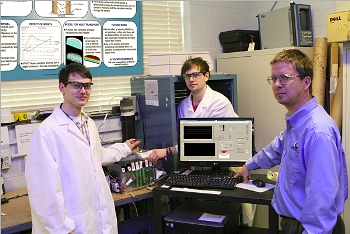University of Delaware Center for Composite Materials (CCM) has partnered with RWTH Aachen University’s Institute für Textiltechnik (ITA) to help engineers create highly conductive 3-D polymer composites.
Though 3-D composites offer several structural and functional advantages than metals, their low thermal conductivity property has limited their applications.
 CCM assistant director Dirk Heider (right) discusses the improvement of through-thickness conductivity in textile composites with German visiting students Martin-Christopher Noll (left) and Christopher Lenz.
CCM assistant director Dirk Heider (right) discusses the improvement of through-thickness conductivity in textile composites with German visiting students Martin-Christopher Noll (left) and Christopher Lenz.
The National Science Foundation (NSF) has provided a $367,000 grant for advancement in 3-D composites. These advanced composites will be used in heat exchangers and other products that require heat or energy dissipation. Deutsche Forschungsgemeinschaft (DFG) has also provided funds for the ITA project.
Dirk Heider, CCM’s Assistant Director, explained that as Unidirectional 2-D composites have low thermal conductivity and are not appropriate for using in heat–generated areas.
The research team includes Heider, Suresh Advani and George W. Laird from UD and Thomas Gries and Michael Glowania from ITA. The team is investigating and distinguishing thermal transport mechanisms when high conductive fibers are vertically integrated into 2-D composites. In addition, the researchers are exploring ways to solve production issues related to these composites.
ITA’s fiber and textile capabilities and CCM’s expertise in materials design, processing and classification bring complementary resources to the project.